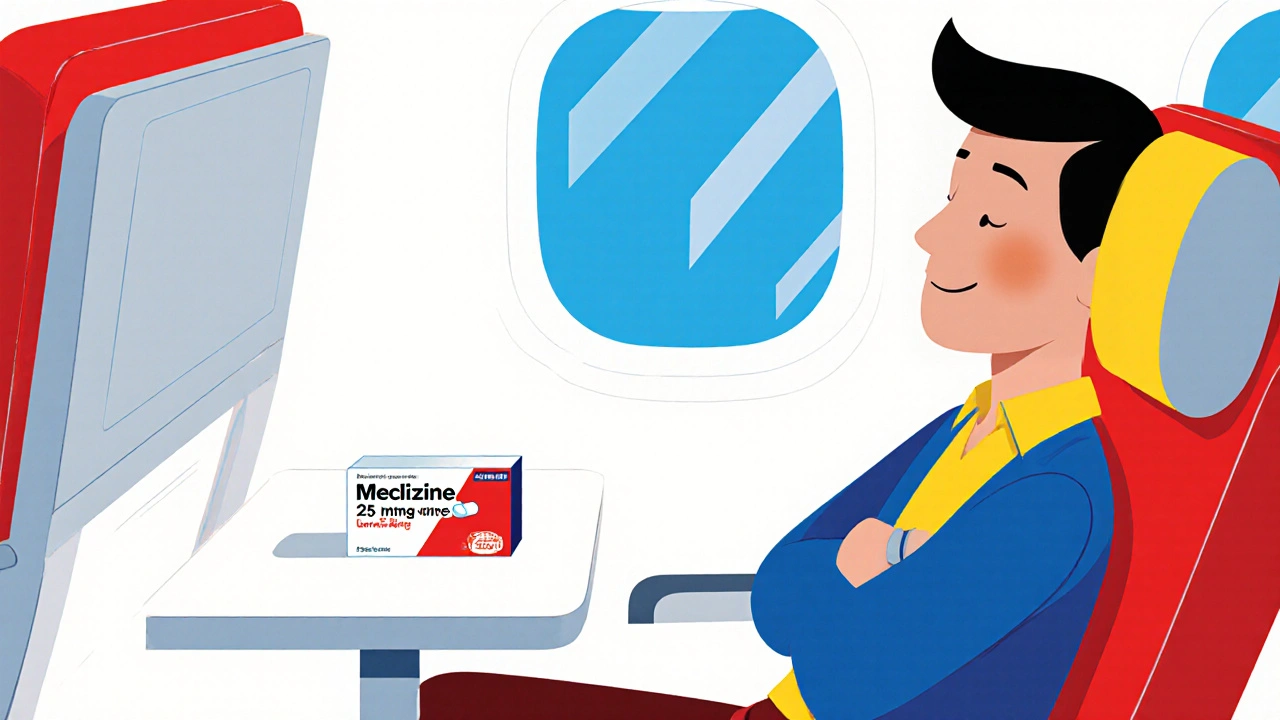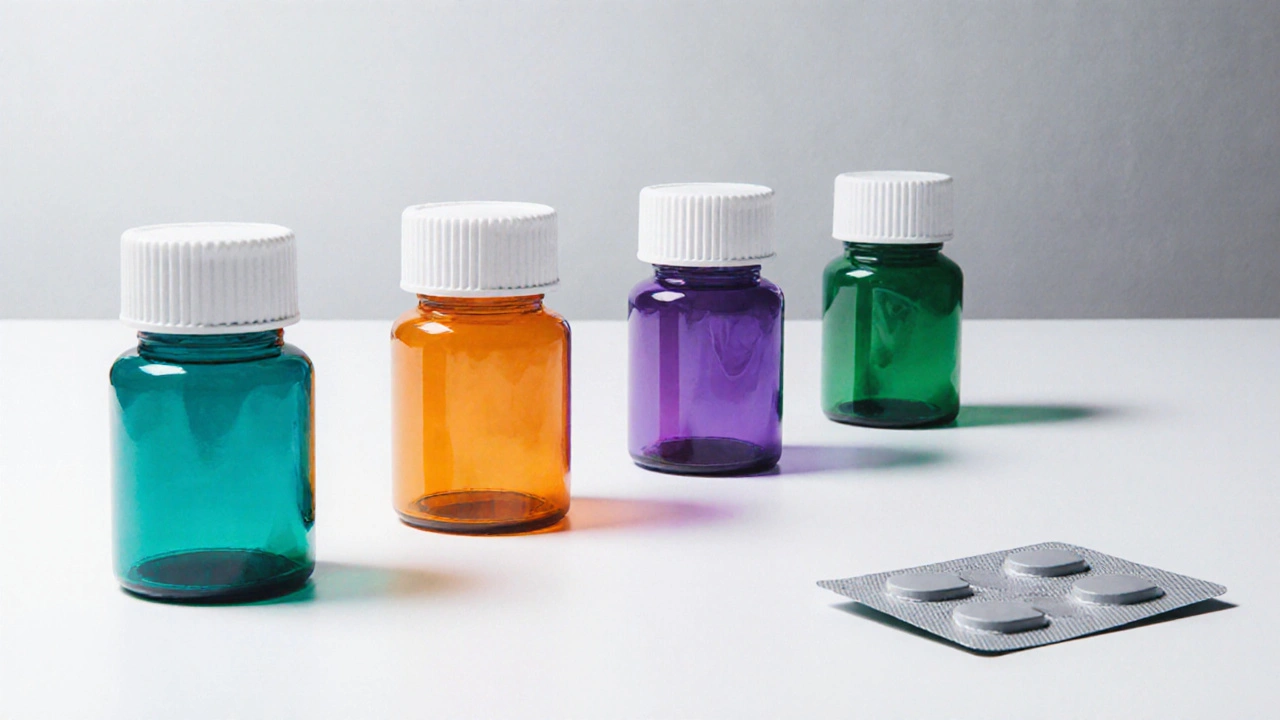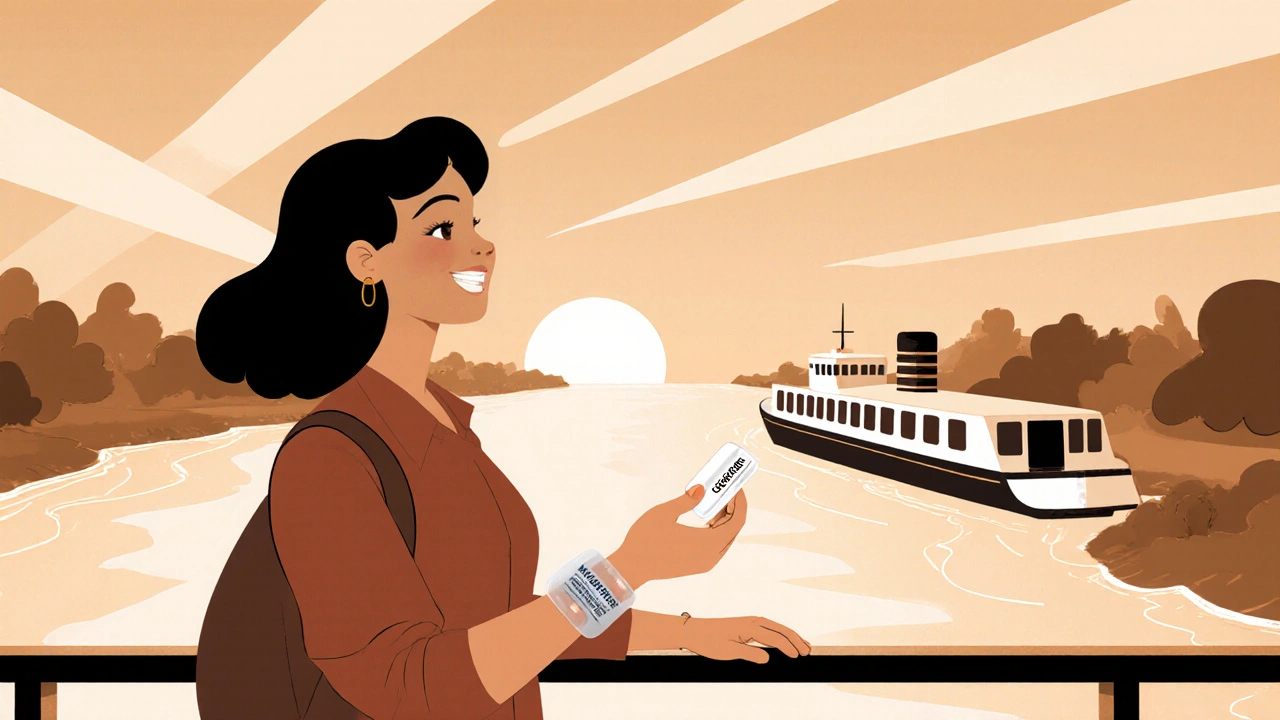Meclizine vs Alternatives: Pros, Cons, and Best Uses

Motion Sickness Medication Selector
This tool helps you select the most appropriate motion sickness medication based on your specific situation, considering factors like trip duration, symptom type, and sensitivity to side effects.
Your Situation
Recommended Medication
Enter your situation above to see a recommendation
Comparison to Alternatives
Select your situation to see comparison details
When you’re battling motion sickness or vertigo, the first thing you reach for is often a pill that promises quick relief. Meclizine is a commonly prescribed antihistamine that blocks the signals in the inner ear that cause nausea and dizziness. But is it always the best choice? This guide lines up Meclizine against its most popular rivals-Dimenhydrinate, Diphenhydramine, Promethazine, and Scopolamine-so you can see which drug fits your symptoms, lifestyle, and tolerance the best.
Why Compare? The Jobs You Want to Get Done
- Identify which medication works fastest for travel‑related motion sickness.
- Understand side‑effect profiles to avoid unwanted sedation.
- Match the drug’s duration to the length of your trip or episode.
- Know prescription versus over‑the‑counter options.
- Pick a safe alternative if you have contraindications (e.g., glaucoma, asthma).
Quick Takeaways
- Meclizine offers 24‑hour relief with mild sedation; best for long trips.
- Dimenhydrinate works fast (15‑30 min) but often causes drowsiness.
- Diphenhydramine is the strongest sedative; useful for nighttime nausea.
- Promethazine adds anti‑emetic strength but can cause dry mouth and drowsy driving.
- Scopolamine patches deliver continuous control for up to 72 hours, ideal for cruises.
How Meclizine Works
Meclizine belongs to the antihistamine class. It blocks H1 histamine receptors in the vestibular system, reducing the brain’s response to abnormal motion signals. The drug is taken orally, usually 25 mg once daily, and reaches peak plasma levels in about 2 hours. Because it has a long half‑life (6‑12 hours), a single dose can cover most day‑long journeys.
Alternative #1: Dimenhydrinate
Dimenhydrinate is an over‑the‑counter antihistamine that combines diphenhydramine with 8‑chlorotheophylline to counteract drowsiness. It hits the bloodstream quickly-usually within 15‑30 minutes-making it a go‑to for sudden seasickness. Typical adult dosing is 50‑100 mg every 4‑6 hours, not exceeding 400 mg per day.
Alternative #2: Diphenhydramine
Diphenhydramine (Benadryl) is a first‑generation antihistamine best known for its strong sedative effect. It works by blocking H1 receptors in both the brain and the inner ear, which can calm severe nausea but also make you feel groggy. Adults usually take 25‑50 mg every 6‑8 hours, with a maximum of 300 mg per day.

Alternative #3: Promethazine
Promethazine is a phenothiazine antihistamine that also blocks dopamine receptors, adding extra anti‑emetic power. It’s often prescribed for motion sickness, post‑operative nausea, and severe allergy reactions. Doses range from 12.5‑25 mg taken 30 minutes before travel, but a prescription is required in many countries.
Alternative #4: Scopolamine
Scopolamine comes as a transdermal patch that releases the drug steadily over 72 hours. It blocks muscarinic receptors in the vestibular nuclei, preventing the brain from interpreting motion signals as nausea. Because it’s a prescription medication, you’ll need a doctor’s note for the patch, which delivers 1 mg over three days.
Side‑Effect Snapshot
All these drugs share the risk of dry mouth, blurred vision, and constipation, but the intensity varies:
| Drug | Class | Typical dose | Onset | Common side effects |
|---|---|---|---|---|
| Meclizine | Antihistamine (H1 blocker) | 25 mg once daily | ~2 h | Mild drowsiness, dry mouth |
| Dimenhydrinate | Antihistamine + stimulant | 50‑100 mg every 4‑6 h | 15‑30 min | Drowsiness, headache |
| Diphenhydramine | Antihistamine (first‑gen) | 25‑50 mg every 6‑8 h | 30‑60 min | Strong sedation, urinary retention |
| Promethazine | Phenothiazine antihistamine | 12.5‑25 mg 30 min before travel | 30‑60 min | Drowsiness, low blood pressure |
| Scopolamine | Anticholinergic patch | 1 mg over 72 h (patch) | ~4 h (patch adhesion) | Dry mouth, blurred vision, confusion (rare) |
Choosing the Right Option for You
Here’s a quick decision tree you can follow:
- If you need all‑day coverage with minimal dosing, go with Meclizine.
- If you’re on a short cruise and want a fast‑acting pill, Dimenhydrinate is a solid OTC pick.
- For night‑time nausea where sleep is welcome, Diphenhydramine’s sedative power can be an advantage.
- When you need a prescription‑strength anti‑emetic for severe motion sickness, consider Promethazine.
- If you’ll be traveling for several days and dislike taking multiple pills, a Scopolamine patch offers continuous protection.

Special Considerations
- Pregnancy & breastfeeding: Meclizine is Category B (US), meaning animal studies show no risk but human data are limited. Dimenhydrinate is also Category B, while Diphenhydramine is Category C. Always consult your GP.
- Age limits: Children under 12 should avoid Meclizine unless a pediatrician advises. Dimenhydrinate can be given to kids 2 years and older in reduced doses.
- Driving & operating machinery: All these antihistamines can impair alertness. Meclizine’s drowsiness is generally milder, but you should test your reaction before getting behind the wheel.
- Interaction with alcohol: Combine any antihistamine with alcohol and the sedation spikes dramatically. It’s safest to stay alcohol‑free while you’re on these meds.
Real‑World Example: A Week‑Long River Cruise
Emma, a 42‑year‑old teacher from Bristol, booked a 7‑day river cruise through Germany. She’s prone to motion sickness but hates feeling groggy. After reading the comparison, she chose Meclizine 25 mg the night before departure and a second dose 2 hours into the first day. The drug kept her comfortable for the whole trip, and she only felt a slight dry mouth. She avoided the patch because she didn’t want a visible device on her skin, and she didn’t want the heavy sedation diphenhydramine can bring on evenings.
When Meclizine Isn’t the Best Fit
If you have a history of narrow‑angle glaucoma, Meclizine (and especially Scopolamine) can raise intra‑ocular pressure. In such cases, a non‑anticholinergic option like Dimenhydrinate-or a prescription of ondansetron, an anti‑emetic that works via serotonin receptors-might be safer. Likewise, patients with severe asthma should steer clear of Anticholinergics.
Bottom Line
Meclizine is a solid, long‑acting choice for most adults dealing with motion‑related dizziness. However, the “best” drug depends on how fast you need relief, how long you’ll be exposed to motion, and how tolerant you are of side effects. Dimenhydrinate, Diphenhydramine, Promethazine, and Scopolamine each fill a niche, so you can match the medication to the journey rather than settling for a one‑size‑fits‑all pill.
Frequently Asked Questions
Can I take Meclizine with other antihistamines?
Combining two antihistamines usually increases sedation and anticholinergic side effects without adding extra anti‑nausea benefit. It’s best to stick with a single drug unless a doctor specifically advises otherwise.
How long before travel should I take Meclizine?
Take the 25 mg dose about 2 hours before you start moving. This gives the drug time to hit peak plasma levels and start calming the vestibular system.
Is Meclizine safe for elderly patients?
Yes, but start with a lower dose (12.5 mg) and monitor for increased drowsiness or blood‑pressure changes, which are more common in older adults.
Can I use Meclizine for vertigo unrelated to motion sickness?
Meclizine is often prescribed for peripheral vertigo (e.g., benign paroxysmal positional vertigo). It can reduce the spinning sensation, though vestibular rehabilitation exercises are usually recommended alongside medication.
What should I do if I miss a dose while traveling?
Take the missed dose as soon as you remember, unless it’s close to the time for the next scheduled dose. In that case, skip the missed one and continue with your regular schedule-don’t double‑dose.
eric smith
October 21, 2025 AT 18:27Oh sure, just pop a meclizine and magically become a seasick‑free superhero.
Brandy Eichberger
October 25, 2025 AT 05:47When it comes to choosing a motion‑sickness remedy, a modest appreciation for pharmacological nuance can elevate your travel experience.
Meclizine, with its 24‑hour coverage, is the go‑to for those who despise the inconvenience of re‑dosing.
Its mild sedation allows you to stay alert enough to enjoy the scenery without the fog of a heavy antihistamine.
The drug’s half‑life of up to twelve hours means you can set it the night before a long road trip and wake up feeling steady.
Side effects, such as dry mouth, are generally tolerable and far less disruptive than the drowsiness induced by diphenhydramine.
Moreover, the convenience of a single daily tablet beats the chore of remembering a dimenhydrinate schedule every few hours.
For airline passengers, the absence of a strong anticholinergic punch reduces the risk of blurred vision during take‑off.
If you suffer from mild hypertension, meclizine’s modest impact on blood pressure makes it a safer choice than promethazine.
Travelers with a penchant for night‑time reading will appreciate that the drug’s sedative effect wanes after the first six hours.
The cost factor also cannot be ignored; generic meclizine is typically cheaper than the prescription‑only scopolamine patch.
From a pharmacokinetic standpoint, its predictable absorption curve eliminates the guesswork associated with the faster‑acting dimenhydrinate.
Clinicians often prescribe it for peripheral vertigo, reinforcing its utility beyond mere motion sickness.
Its reputation as a ‘well‑tolerated’ medication is bolstered by numerous studies showing low incidence of severe adverse events.
Nonetheless, patients with narrow‑angle glaucoma should steer clear, as even a mild anticholinergic effect can exacerbate intra‑ocular pressure.
In summary, if you value consistency, affordability, and a side‑effect profile that leans toward the gentle side, meclizine deserves top billing.
Eli Soler Caralt
October 28, 2025 AT 16:07i cant help but wonder if the universe itself is just a giant vestibular organ, and we are all just trying to find the right antihistamine to keep it from spinning 🌪️😊. meclizine feels like the cheap coffee of the pharmacology world – it gets the job done but never gives you that existential jolt. dimenhydrinate, on the other hand, is the espresso shot that wakes you up just enough to notice the absurdity of it all. diphenhydramine is the night‑cap that whispers sweet nothings while your brain checks out. 💤
Eryn Wells
November 1, 2025 AT 03:27Great rundown! 🌍 For anyone traveling with kids, it’s worth noting that dimenhydrinate can be given to youngsters as young as two, but you should always double‑check the dose.
Also, if you’re planning a cruise, the scopolamine patch is discreet and eliminates the need for multiple pills, which many passengers appreciate.
Stay safe and enjoy the journey! 😊
Kathrynne Krause
November 4, 2025 AT 14:47Alright, let’s paint a vivid picture: you’re on a winding mountain train, the hills roll like emerald waves, and you’ve just taken a single 25 mg meclizine tablet. Within two hours, the world steadies, and you’re soaking in the panorama without that nauseous twist. Contrast that with diphenhydramine – you’d feel like you’re drifting into a cozy nap while the scenery whizzes by. If you crave alertness and a dash of adventure, meclizine is the vibrant brushstroke on your travel canvas. 🎨🚂
Angela Koulouris
November 8, 2025 AT 02:07When you’re coaching someone through motion‑sickness, I always suggest a trial run before the big trip. Take a low dose of meclizine a day ahead, note any dry mouth or drowsiness, and adjust accordingly. It’s a simple, low‑risk way to gauge tolerance without committing to a full schedule.
Esther Olabisi
November 11, 2025 AT 13:27Yo, quick tip: drink plenty of water with any of these meds, especially the patch. It helps with the dry‑mouth thing and keeps you from feeling like a desert 🌵. Also, avoid alcohol – it just makes the sedation level go off the charts. 😏
Ivan Laney
November 15, 2025 AT 00:47Let’s get real: the United States prides itself on producing the highest‑quality pharmaceuticals, and meclizine stands as a testament to our superior research capabilities. While other nations peddle dubious over‑the‑counter concoctions, we provide a drug that not only works reliably but also upholds the rigorous standards that protect our citizens from unnecessary side‑effects. The long‑acting nature of meclizine means fewer doses, which translates to less waste and a more efficient use of resources – something our tax‑paying populace can truly appreciate. Moreover, the dosage guidelines are crystal‑clear, ensuring even the layperson can follow them without confusion, unlike the convoluted instructions you might encounter with foreign products. In short, when you choose meclizine, you’re not just selecting a medication; you’re endorsing the pinnacle of American scientific achievement and the values of safety, efficacy, and convenience that define our nation’s commitment to health.
Vivian Annastasia
November 18, 2025 AT 12:07The data clearly shows that combining antihistamines compounds the risk of severe sedation – a fact some marketers conveniently ignore to push sales. By presenting each drug in isolation, they hide the dangerous synergistic effects that can cripple a driver’s reaction time. Such deceptive practices betray a blatant disregard for consumer safety.
John Price
November 21, 2025 AT 23:27Meclizine works fine.
Erika Thonn
November 25, 2025 AT 10:47i think the real question is whether the soul of the traveler can survive the drowsy veil of antihistamines. if not, maybe we need a more spiritual solution, like mindfulness or chemo‑therapy of the mind. just a thought.
Ericka Suarez
November 28, 2025 AT 22:07Listen, America’s best drug is meclizine – it’s simple, cheap and works. any other option is just a fancy gimmick for the elite who think they need a patch or a stimulant. dont let them fool you, stick with the tried‑and‑true.
Jake Hayes
December 2, 2025 AT 09:27Meclizine is generally safe, but patients with glaucoma should avoid it. It’s a straightforward recommendation backed by clinical guidelines.
parbat parbatzapada
December 5, 2025 AT 20:47Ever wonder why the big pharma pushes these meds? They're probably part of a hidden agenda to keep us dependent on chemicals. The truth is out there, but they keep silencing the voices.
Rachel Valderrama
December 9, 2025 AT 08:07Sure, because reading a 15‑sentence paragraph will definitely cure your motion sickness. 🙄